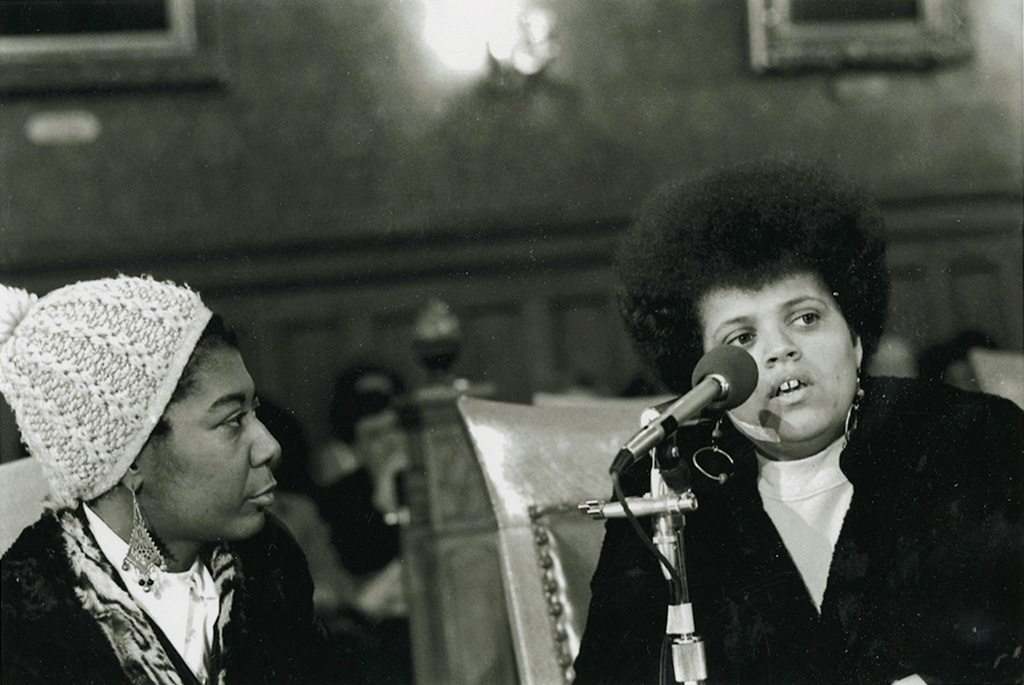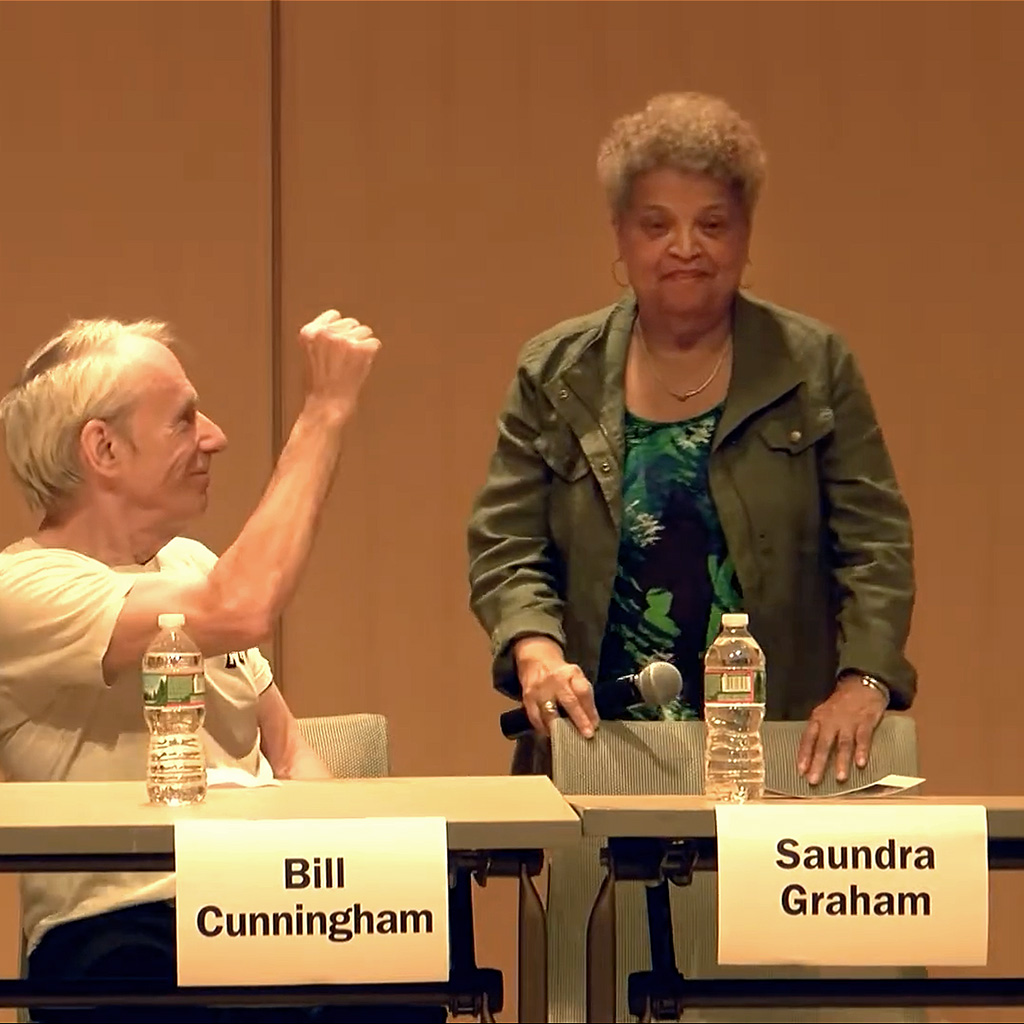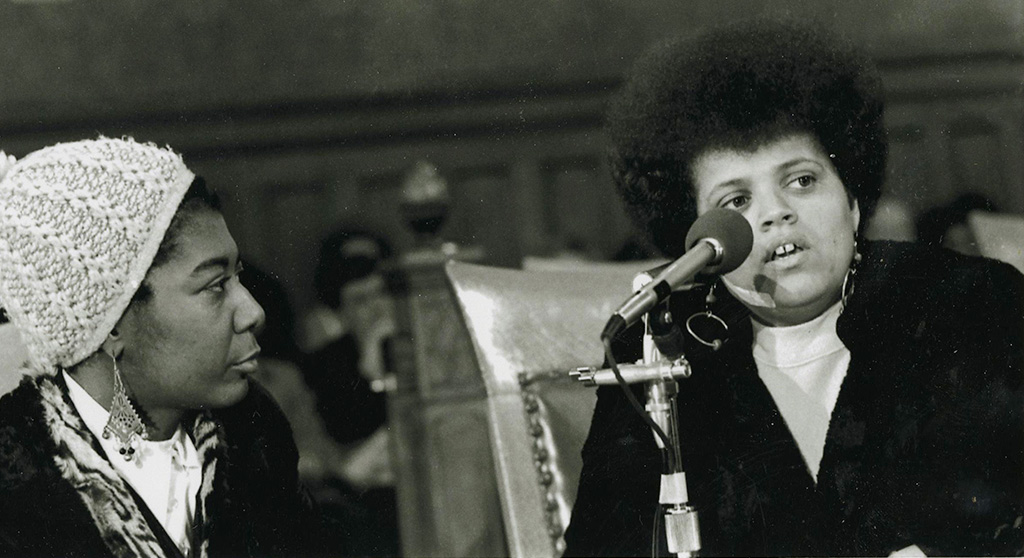Saundra Graham dies at 81, a legislator and leader who stormed Harvard stage against displacement

Saundra Graham speaks at police brutality hearings at Cambridge City Council in January 1971. With her in a photo from the Cambridge Public Library’s archives and special collections is Joanne Pelham. (Photo: Olive Pierce)
Saundra Graham, Cambridge’s first Black woman city councillor, a former Massachusetts state representative and namesake of the Graham & Parks School with fellow civil rights activist Rosa Parks, passed away at age 81 on Friday.
City council members reflected on her life and contributions to Cambridge in a resolution at their Monday meeting.
“Saundra Graham left an indelible stamp on the City of Cambridge and has positively impacted the lives of countless residents. Her legacy shall continue to inspire future generations in their efforts to build a more equitable and just society, and her memory shall forever be cherished,” the resolution read.
Councillor Marc McGovern noted that Graham’s death comes just five months after that of former city councillor, mayor and state representative Alice Wolf. “For some of us who were raised here and have been around Cambridge politics for a long time, that generation that is right before us were really pillars of the community,” McGovern said. “To some of the folks who are newer to Cambridge: What you love about the city was really based on a foundation that people like Saundra Graham put down for us.”
Born in Cambridge on Sept. 5, 1941, as one of 11 children, Graham received her education in Cambridge Public Schools, the University of Massachusetts at Boston and Harvard University’s extension school. According to the resolution, she became a single parent in the 1960s and raised her five children in Cambridge. She entered the city’s political sphere in 1968 as a member of the board of directors of the Cambridge Community Center, then served as president of the Riverside Planning Team in 1970 and as president of Riverside Cambridgeport Community Development Corp. in 1971.
Taking on Harvard with humor
In 1970, she led a march on Harvard University’s commencement in an attempt to get school officials to back down from a dorm expansion plan that would have displaced Riverside residents. Graham’s actions, which halted the commencement for nearly half an hour, forced Harvard to acknowledge the issue publicly and take accountability for the removal of longtime residents, later installing housing complexes for families and seniors.

Saundra Graham stands to speak at a July 2017 event to a salute from fellow activist Bill Cunningham in a screen capture from a CCTV video.
During “Radical: Cambridge and Somerville activism in the ’60s and today,” an event Cambridge Day sponsored in July 2017 at The Cambridge Public Library, Graham recalled her 1970 march on Harvard and how she continued to advocate for affordable housing in Cambridge.
The night before the march she enlisted volunteers to prepare sandwiches for demonstrators — including then-Harvard president Nathan Pusey’s wife, who sat on the settlement board and was unaware of the group’s plans.
“So the night before, Mrs. Pusey was in the kitchen with us making tuna fish sandwiches for the families who were going to walk to Harvard. It was so funny, I’m sorry, I had to laugh,” she said to laughs from the lecture hall audience. “She was making those tuna sandwiches and she didn’t know that we were going to march on Harvard.”
Graham believed the success of the march was among the first victories of a decadeslong battle. “We still have our battles. We’ve won some and we’ve lost a lot, but we’re going to continue to fight to keep whatever we have there,” she said.
Political works
Biographical information from The Graham & Parks School details her political accomplishments within the city and state legislatures. In 1971, she became the first Black woman elected to the City Council, where she served until 1989; from 1972 to 1983 she chaired its Housing and Land Use Committee and was instrumental in securing federal housing funds for the city. From 1976 to 1977 she served as vice mayor, and from 1977 to 1978 she chaired the Multicultural Arts Committee. Through her efforts, Graham saved an East Cambridge courthouse from demolition – it became the Multicultural Arts Center – and was able to rehabilitate and modernize several public housing complexes.
Graham then represented the 4th Middlesex District in the Massachusetts House of Representatives from 1977 to 1988 and was the first Black woman elected to the state Legislature from Cambridge. During her time in office, she served as a chair for the Massachusetts Black Legislative Caucus and was a member of the Massachusetts Caucus of Women Legislators. She was a member of the Joint Committee on Housing and Urban Development. Alongside her political achievements, Graham was a member of the Boston Black United Fund and served as secretary to the National Black Caucus of Local Elected Officials.
“She served with distinction and she worked very long, well after she stepped down from the City Council, helping our community grow up here in Cambridge, raising her family here in Cambridge and really gave in large forms so much of herself to her community,” councillor E. Denise Simmons said Monday.
Honors and advice
Beyond her political contributions, Graham founded the Massachusetts Childcare Coalition in 1979 on the belief that “day care is not a luxury, it’s an essential.” In 1981, the Graham & Parks School was formed from two conjoined Cambridge schools, renaming it for her and Rosa Parks.
Her public service has been recognized with numerous awards, the most notable including the 1976 National Sojourner Truth Award from the National Association of Negro Business and Professional Women’s Clubs, the 1980 Recognition Award by the Central Square Cambridge Businessmen’s Association and the 1982 “Woman of the Year” in government award by the Boston Chapter of the National Organization of Women.
McGovern said he often called Graham, a longtime family friend, for advice. “Sometimes that advice was a good hard kick in the pants, which I needed at times. But it was always welcomed,” he said. “And it was always done with love.”
At the Radical event in 2017, Graham had some of that to offer around the work she started in the 1960s and 1970s: “Hopefully, we’ll get a City Council with some guts that will help us with the affordable housing issue in the future,” she said, “and hopefully we can bring some families back to Cambridge.”



…a giant to be celebrated…
Saundra Graham was unique, there was not another like her before or after. However she was far from being our first Black city councillor. There were several in the 19th century. Franklin Wright served two terms in the early 1920s. Tom Coates served three terms beginning in 1964. Henry Owens III was elected in 1972, the same year Saundra began her 18 years on the city council.
Saundra was a force of nature and a huge contributor to social justice in our City and Commonwealth. I learned so much from her. It was a privilege to serve with her on the City Council and to work hard for her election to the state House.
Thanks for the correction! Saundra was indeed the first Black FEMALE Cambridge city councillor
Saundra Graham was so inspiring in her work for affordable housing and other key issues in Cambridge. I’ll miss her fire!
In the obituary of Saundra Graham, it is sad that her “joke” about Mrs. Pusey was included, since it suggests that Ms. Graham was insensitive to the strong support that her activism was receiving from the Cambridge community, which included Mrs. Pusey. It certainly sounds as if Mrs. Pusey was fully behind Ms. Graham’s movement and was trying to help in a fundamental way by making sandwiches for the demonstrators. It seems a shame for Ms. Graham to have reveled in having hidden from Mrs. Pusey that the demonstrators planned to disrupt the Harvard Commencement, and then to have presented it as a joke in a public speech.
Saundra was a long-time resident of Riverside and was concerned about Riverside issues, as well as citywide issues, even after retiring from her political roles. She is responsible for the fine commemorative obelisk in Cronin Park that depicts scenes from Riverside, and for the revised design of the park that is a relaxing place to sit and spend some time surrounded by some beautiful trees, shrubs, and flowering plants. When I mentioned to her the inappropriate first design from the city, she agreed it had nothing to do with Riverside. She therefore contacted the city and the results were a meeting with Riverside residents who came up with specific suggestions, the appointment of another artist, and the beautiful resultant commemorative obelisk. Thank goodness for Saundra.